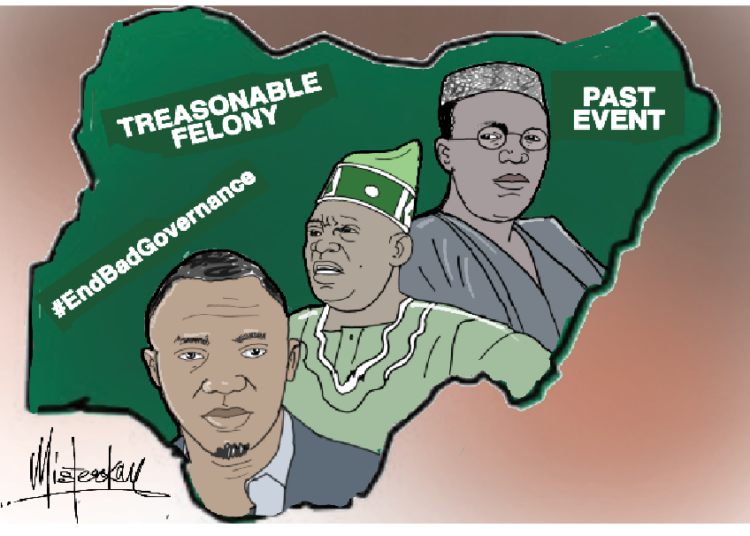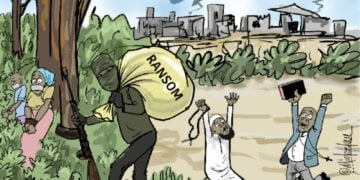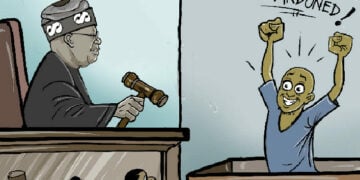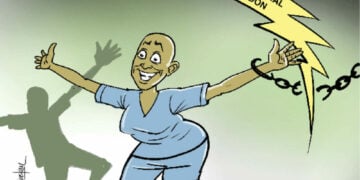This piece will mainly be a reminiscence of the past. By relying on documented events and informed opinions, we want to illustrate that the prevailing features of Nigeria’s politics have, unfortunately, not yet changed considerably from what they were during the epoch that is baselessly dismissively referred to as the “ugly past!”
Therefore, since Nigeria’s current politics is still synonymous with its past, in many aspects, then let us explain today’s (negative) political occurrences (if they are considered so) using the past; hoping that we will all learn, in order that the “ugly past” may be firmly disallowed from repeating itself; that is, if there will be a good future for Nigeria, considering the way the country is presently being ruined.
What we intend to say here is not new. Is there anything new under the sun? Anyway, what we can confidently say is that Nigerians are quick at sweeping problems under the carpet while they simply “move on.” They are good in what we call episodic forgetfulness especially when it concerns injustices done to others. This weakness associated with Nigerians is aptly described in words by Matthew Hassan Kukah. Hear him clearly: “…..Nigerians are very forgetful and the result is that this amnesia has contributed to diminishing us as a people…..” To buttress this vital point, let us go into the news archives.
In the October 4, 1999 edition of Tell magazine, its column, “From the Editor”, signed by the Editor-in-Chief (Nosa Igiebor) states that on “…..October 1 [1999], Nigeria will be celebrating its 39th year as a sovereign, independent state. It will be one anniversary with a difference; there will be no bemedalled general assaulting our sensibilities with a studied pretence to patriotism. We now know that the more ‘patriotic’ a military dictator is, the greater his appetite for raiding the national treasury. Instead, an elected president will, for the first time since 1983, address the nation on Independence Day, to invest a battered, cheated people with a fresh hope for the future. This is very important because Nigerians must be made to believe in themselves and country again after the near holocaust of 16 unbroken years of military brigandage…..Today [in 1999], Nigerians are still pinching themselves wondering whether the ‘fuel crisis’ is really ended…..” Further, in its editorial, the magazine submits that “…..the reality today [in 1999] is that the Nigerian nation is sick…..Predictably, Nigeria has become a sorry basket case, ever begging for loans, debt-forgiveness and pity from countries that yesteryear saw it as a role model…..”
Wait a minute – a rhetorical question: has Nigeria’s politico-economics changed for the better since 1999? Still on the historical lane, the military junta of Sani Abacha (1943–1998) arraigned Ameh Ebute and five others in court, in 1994, for what it called “treasonable felony and conspiracy” for announcing the reconstitution of parliament that the junta earlier shut down in November, 1993. Ebute was the senate president in the aborted Third Republic. The other five (Polycarp Nwite, Rev. Mac Onyemechi Nwulu, Onyeka Amadi Okorafor, Abu Ibrahim and Bola Tinubu) were senators in that senate. We have just paraphrased a news report in The News magazine of August 1, 1994; a weekly periodical that had Bayo Onanuga as its Editor-in-Chief/CEO! Similar scenarios like the one relayed above are not rare in Nigeria! They have been with us since the heyday of the British colonialists to when Obafemi Jeremiah Oyeniyi Awolowo (1909–1987), Anthony Eromosele Enahoro (1923–2010) and others were tried and convicted for treason in 1962/1963-64. Fast forward to 1998, James Ajibola Idowu Ige (1930–2001), Lamidi Ona-Olapo Adesina (1939–2012) and 18 others were imprisoned and tagged “prisoners of war” by Abacha’s government for asking it to honour the electoral mandate given to Moshood Kasimawo Olawale Abiola (1937–1998) who won the June 12, 1993 presidential elections. In 2019, Omoyele Sowore was also arraigned in court for treason. Other examples, too numerous to mention, also exist over time. We wonder how time flies while things remain the same in the Nigerian body polity. What a unique country!
Unsurprisingly, 30 years later, (after 1994), news reports have it that Nigerian federal government, on September 2, 2024, arraigned ten protesters – arrested in Abuja, Kano and Kaduna between August 1st and 10th – in connection with #EndBadGovernance demonstrations on charges of war plotting and an attempt at toppling the current Nigerian president. Wonderful! Are they talking about unarmed placard-carrying peaceful protesters? Interesting! Power can intoxicate. A question is: what is the name of the current Nigerian president? You have the answer above. Nigeria police arraigned the ten accused persons at a federal high court in Abuja. According to the charges, the accused persons are alleged to be acting in concert with a 70-year-old British citizen named Andrew Martin Wynee (aka Andrew Povish) to incite mutiny and other subversive activities. The case is in court. So, we have no comment on it. However, the strategy by those in Nigerian governments remains the same once they become uncomfortable with alternative opinions. Everyone is to either hail the emperor or keep quiet. The Nigerian state cares less about it appearing to not derive its legitimacy from the people; rather, the (Nigerian) people are the ones whose legitimacy and citizenship are at the discretion of holders of state powers. What a contradiction! A classic case of the tail wagging the dog. This type of state capture is worth in-depth studies by scholars.
For now, one thing Nigeria has not experienced is a sheer audacity, by those in governments since 1999, to promulgate the “Abacha-like” 1993 Treason and Treasonable Offences Decree he (Abacha) inherited from Ibrahim Babangida’s regime. Although, we know that the decree still exists in state actors’ mind taking into account the way those in power and their agents behave, this decree “was” an omnibus decree tailor-made for government’s critics, human rights activists and real or imagined enemies. Nigerians are always caught napping by their misleading “leaders” who have been gleefully ruining the collective patrimony owing to Nigerians’ shared docility and amnesia. Thus, compatriots who care to listen should be constantly reminded of the possibility of their “leaders” reapplying strategies erroneously believed to have been dumped into the trash bin of history. Perhaps, Nigeria made the mistake of allowing military incursions into its politics as it is said (rightly or wrongly) that soldiers were (are) not cut out for partisan politics; hence, governments resulting from such incursions tend to be widely labelled as aberrations. Nevertheless, the “civilian politicians” who took over from the military despots are currently in the same mould as those juntas. There has been so much impunity in Nigeria’s body polity more than it was during the days of military governments. In fact, these civilians are worse as dictators than the military despots.
As Nigeria attained its 64th year as a sovereign, independent country on October 1, 2024, Nigerians have been programmed to be oblivious to the difference between “national interest” and state captors’ interest. Both appear the same. This applies to what those in governments consider as “national security”. It has always been about the comfort and preservation of themselves and their class. Simple! You should know that Nigerian politicians’ packaging may differ but their content remains the same. These unjustifiably indulged shameless characters have been allowed to believe that they are doing the people a favour for being in government. So, it should not be surprising to those conversant with history when those now referring to themselves as “democrats” use state security apparatus in hounding their perceived enemies such as rights activists, critics, scholars, journalists, labour leaders, etc. These pretender “democrats” are simply fascists! Democrats are not livid when confronted with objective criticism; they convince with superior arguments. They do not engage in repressive tactics against those having alternative or opposing views; that is jackboot mentality. Dele Omotunde in Tell magazine of May 31, 1993 says that “…..A government that is allergic to criticism automatically forfeits its right to rule.
The right of the people to openly criticise their government and hold contrary opinions is one of the pillars of true democracy and should not be denied them. Any attempt to repress free speech can only lead to subterranean movements and whisperings that can eventually lead to a volcanic eruption of unimaginable proportions…”
– Prof. Erakhrumen currently teaches at the Department of Forest Resources and Wildlife Management, University of Benin, Benin City, Nigeria





